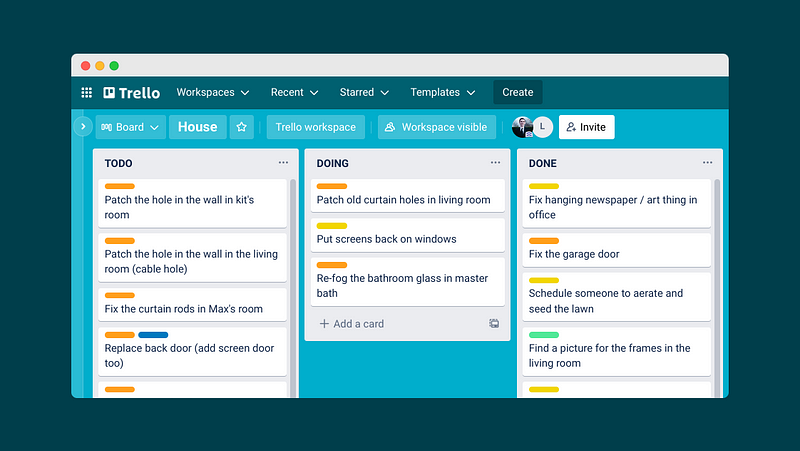Mastering Your Time: A Guide to Living Fully Each Day
Written on
Chapter 1: The Challenge of Time Management
Last year, I found myself drowning in tasks, feeling that the hours in a day were simply insufficient. Like many avid readers, I sought out literature that would help me better manage my time.
I began with a classic: Getting Things Done: The Art of Stress-Free Productivity.
The fundamental premise of this book is that we cannot keep every thought and task in our heads simultaneously. Despite our best efforts, we often find ourselves juggling numerous "tabs" in our minds. The key lesson is to abandon this mental juggling act. Instead, we should document everything and concentrate solely on the task at hand.
Now, I keep track of all my responsibilities through a few Trello boards rather than cluttering my mind. When I switch tasks or need to decide what to tackle next, I have a clear, prioritized list to guide me.

What did this shift yield? Enhanced productivity at work, significant progress on my budgeting project at purchaseplan.io, and, surprisingly, completion of various home improvements. However, despite being more effective with my time, I still felt a sense of overwhelm. Even with my efforts, I often thought that 24 hours simply wasn’t enough.
That’s when I encountered my favorite book of 2021, How to Live on 24 Hours a Day by Arnold Bennett.

Chapter 2: Understanding Arnold Bennett
Have you ever heard of Arnold Bennett? I hadn’t until recently. Over a century ago, The New York Times Book Review stated that anyone wishing to engage in literary conversations had to read his works. Bennett was a prolific author and the most commercially successful British writer of his time, producing novels, editing a women’s magazine, and even managing England's Ministry of Information during World War I. Sadly, his literary reputation suffered due to criticism from Virginia Woolf shortly before his death, leading to his overshadowing in literary discussions.
Bennett wrote this book in the early 1900s while residing in Paris, reflecting on the lives of white-collar workers back in London. He paints a portrait of a typical Londoner who likely dislikes their job, suggesting that not much has changed since 1908.
Our Londoner wakes up at the last possible moment, rushing to catch the train, reading the newspaper during the commute. They work from 10 AM to 6 PM with minimal effort, and after the workday, they return home, feeling drained, and spend the evening in a haze of dinner, social visits, and sleep. This routine repeats day after day.
During Bennett's time, it was common to write about living on a specific daily income, but he questioned why more wasn't said about living within a limited time frame. He believed there were ways to transform our routines—not just to be more productive but to live more purposefully. He challenged us to consider whether we ever truly engage fully in our lives.
The first video titled How To Live On 24 Hours A Day (Like A High Performer) explores how to maximize each day, offering insights on time management and productivity.
Section 2.1: Reevaluating Our Time Usage
Bennett urges us to view the day not just as nine to five but as a full twenty-four hours divided into three segments: approximately eight hours for sleep, eight for work, and eight hours for everything else.
He emphasizes the importance of those remaining eight hours. For many who don’t find joy in their jobs, these hours are crucial for creating a fulfilling life. How can we utilize them effectively?
Reflecting on how we spend those eight hours, I’ve realized many of us squander them on passive activities—watching TV, scrolling through social media, or simply being idle. Often, we feel too exhausted to engage meaningfully, yet we don’t go to bed either.
I confess, I sometimes find myself too fatigued to interact with my kids after work, opting instead for mindless distractions that leave me feeling unfulfilled.
What alternatives exist for us during this time?
The second video titled How to Live on 24 Hours a Day by Arnold Bennett dives deeper into Bennett's philosophy, encouraging viewers to reflect on their daily routines and make meaningful changes.
Section 2.2: A Path to Deeper Living
Bennett proposes we start by critically assessing our eight “free” hours. He suggests that time spent commuting or reading the newspaper could be better utilized.
He encourages setting aside just ninety minutes every other day, three days a week, for personal growth and learning. This could mean dedicating thirty minutes each morning and a few hours in the evening for enrichment.
The goal? To lead a richer, more meaningful life.
Bennett advocates for using our evenings to learn about something that captivates us—be it music, sports, or deeper subjects like science and philosophy. The idea is to immerse ourselves in areas of interest, enhancing our enjoyment and understanding.
Additionally, he emphasizes the importance of morning reflections, promoting dedicated thinking time rather than idle pondering. This practice requires focus, which can be difficult at first.
When combined, these habits can create a structure for learning and reflection that enriches our daily experiences.
Chapter 3: Cautions and Considerations
Bennett offers several pieces of advice for those seeking to implement his ideas.
Firstly, he suggests starting small. Set aside a brief period for reflection and be prepared for interruptions. It’s crucial to avoid strict adherence to the schedule; the aim is for these practices to enhance your life rather than constrain it.
Moreover, he warns against elitism in self-improvement. Not everyone can implement these changes, and that's perfectly acceptable. Life enhancement should not become a burden.
Lastly, he highlights the possibility of early setbacks. The initial enthusiasm for self-improvement may wane when faced with challenges, so it's essential to pace oneself.
Chapter 4: A Life Lived Fully
Recently, we lost a cherished colleague to COVID-19. Though I knew him for a short time, I quickly learned he was someone who truly embraced each day.
Colleagues shared memories of his creativity—writing limericks, painting, and sharing his passion for art and history. He exemplified Bennett's belief that nothing is mundane.
This colleague dedicated time to learn and reflect, sharing his insights with others, thereby enriching our lives and work environments.
Author's Note: I will donate all proceeds from Medium and Amazon Associate Links in this post to support my colleague’s family through GoFundMe.
You can find How to Live on 24 Hours a Day on Amazon or read it for free online.